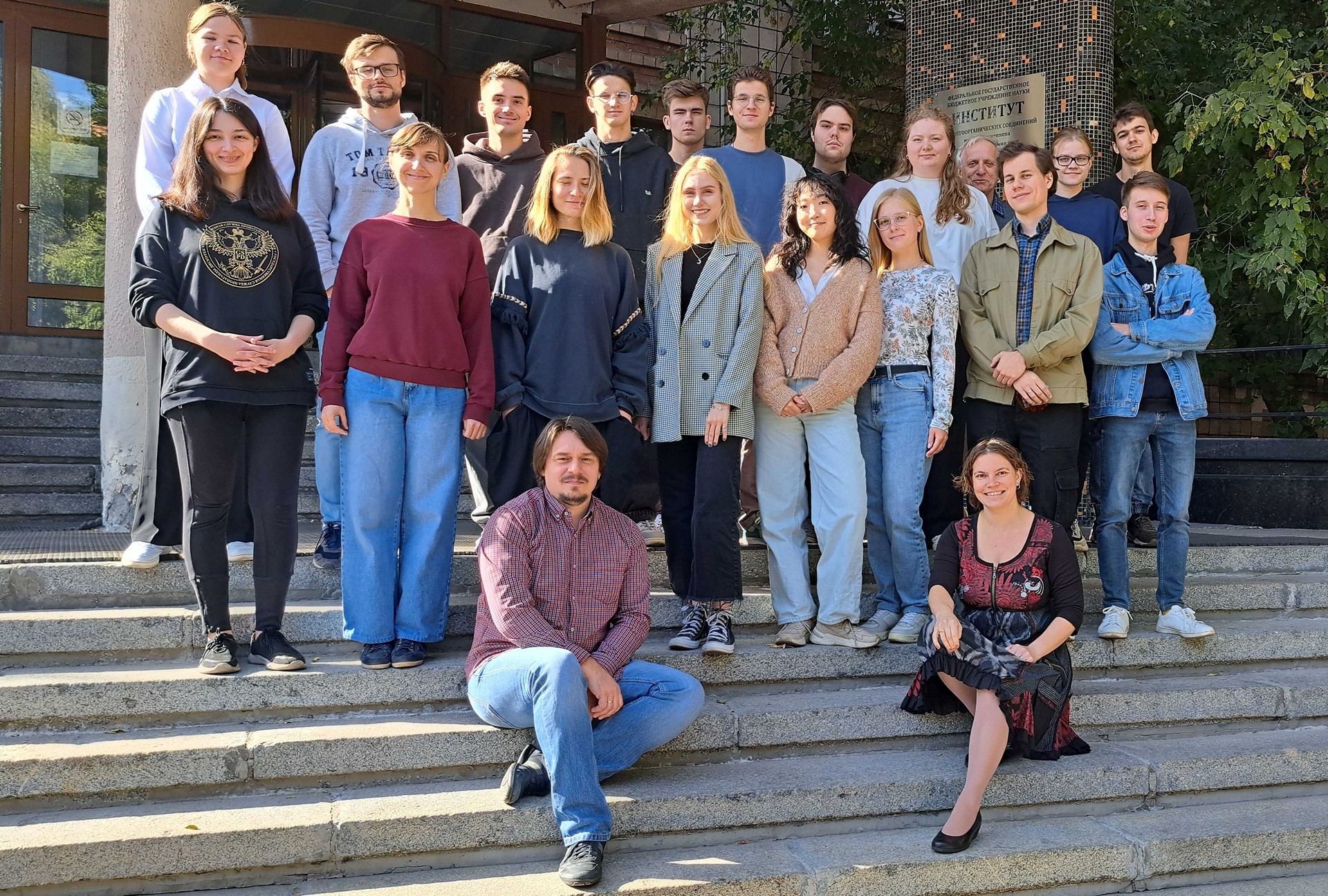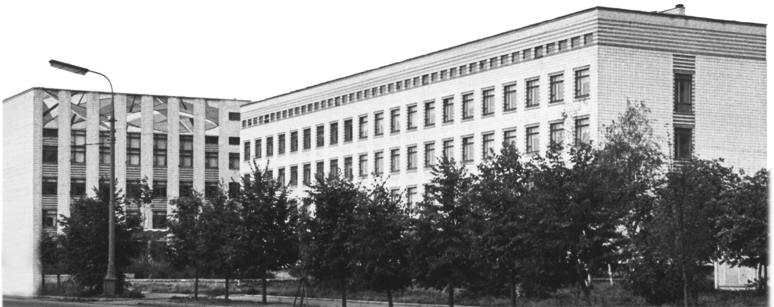
Head: Alexey Rodionov, Ph.D.
Staff
Nelyubina Yu.V. Ph.D. Dr. Habil. (former Head of CISM lab), Khakina E.A. Ph.D., Naumkin A.V. Ph.D., Nikovskiy I.A. Ph.D., Aliev T.M. Ph.D., Volkov I.O. Ph.D., Pak A.M. Ph.D., Zlobin I.S., Saffiullina E.S., Zakharova D.V., Aksenova S.A., Antoshkina E.P., Babaskina M.M., Danshina A.A., Lipatov E.S., Nikitinskiy A.S., Rekut N.A., Sinelnikov A.N., Strunin D.D., Titov K.O., Toropov P.A., Tugushev M.D.
History
Group for investigation of molecular materials (GRIMM) was created in 2024 by researches of the Laboratory “Center for molecular composition studies” (CISM lab), which existed as a separate research unit of INEOS RAS since 2017 when it was transformed from the scientific and technical center for X-ray diffraction named after Yu.T. Struchkov. In 2018, it was expanded to include the Laboratory for structural research of polymers at INEOS RAS.
Since its inception under the leadership of Yu.V. Nelyubina, the CISM lab conducted scientific research focused on the creation of new materials and devices, among others, by using 3D-printing and machine learning, for molecular electronics and spintronics, sensorics, catalysis, medical diagnostics and therapy, and food quality control. Until 2024, it also functioned as the Center for Collective Use (CCU) of Scientific Equipment of INEOS RAS. After the separation from CCU in 2024, the CISM lab was transformed into the Group for investigation of molecular materials (GRIMM) that continued the scientific tradition of CISM lab under the leadership of A.N. Rodionov.
Research directions
- Design of metal complexes with “switchable” magnetic properties and development of approaches to their rapid identification for use as molecular switches, sensors for magnetic resonance imaging and materials for spintronics and information storage and processing
- Creation (among others, by 3D-printing) of molecular and hybrid materials based on metal-organic frameworks for catalysis, sensorics, soft robotics and determination of the atomic structure of small molecules and polymers
- Creation of devices for molecular electronics, spintronics and sensorics
- Development of biocompatible materials for smart food packaging
- Creation of electrochemical sensors for food quality control and medical diagnostics
- Development of electrochemical approaches to the synthesis of valuable (elemento)organic substances
- Machine learning in chemistry, chemometrics, chemoinformatics
- Development of redox-active molecular platforms for targeted drug delivery
- Metabolomics of microorganisms in food products, proteomics
- Bioorganic chemistry of metalorganic compounds
- Gas-phase reactivity of metalorganic compounds
- Analytical applications of mass spectrometry, chromatography, electrochemistry, optical spectroscopy, X-ray diffraction and photoelectron X-ray spectroscopy
Key publications 2018–2024
- A. Risa, L. Barrios, R. Diego, O. Roubeau, D. Aleshin, Yu. Nelyubina, V. Novikov, S. Teat, J. Ribas-Ariño, G. Aromí, “Engineered π⋯π interactions favour supramolecular dimers X@[FeL3]2 (X = Cl, Br, I): solid state and solution structure”, Chem. Sci., 2024, DOI: 10.1039/D4SC01365D.
- A. Belova, A. Belov, A. Danshina, Ya. Zubavichus, D. Aleshin, A. Pavlov, N. Efimov, Ya. Voloshin, “Effects of solvatomorphism, the nature of a chelating ligand synthon and a counterion on the single crystal XRD structure and SMM properties of paramagnetic monocapped cobalt(ii) tris-pyrazoloximates”, Dalton Trans., 2024, 53, 1482.
- A. Pak, E. Maiorova, E. Siaglova, T. Aliev, E. Strukova, A. Kireynov, A. Piryazev, V. Novikov, “MIL-100(Fe)-Based Composite Films for Food Packaging”, Nanomat., 2023, 13, 1714.
- V. Lesnikov, I. Golovanov, Yu. Nelyubina, S. Aksenova, A. Sukhorukov, “Crown-hydroxylamines are pH-dependent chelating N,O-ligands with a potential for aerobic oxidation catalysis”, Nature Commun., 2023, 14, 7673.
- I. Zlobin, V. Novikov, Yu. Nelyubina, “Coordination compounds in molecular spintronic devices”, Russ. Coord. J., 2023, 49, 3.
- P. Kuznetsov, I. Martynov, I. Zhidkov, L. Gutsev, E. Khakina, E. Zakharchenko, N. Slesarenko, A. Kukharenko, P. Troshin, “Molecular structure – intrinsic photostability relationships for diketopyrrolopyrrole-based conjugated polymers”, J. Mat. Chem. A., 2023, 11, 9019.
- A. Pak, Yu. Nelyubina, V. Novikov, “Natural hydrocolloids as biocompatible composite materials for food applications”, Russ. Chem. Rev., 2023, 92, RCR5102.
- D. Aleshin, R. Diego, R. Barrios, Yu. Nelyubina, G. Aromi, V. Novikov, “Unravelling of a [High Spin – Low Spin] ↔ [Low Spin – High Spin] Equilibrium in Spin-Crossover Iron(II) Dinuclear Helicates Using Paramagnetic NMR Spectroscopy”, Angew. Chem. Int. Ed., 2022, 61, e202110310.
- I. Nikovskiy, D. Aleshin, V. Novikov, A. Polezhaev, E. Khakina,. Melnikova, Yu. Nelyubina, “Selective Pathway toward Heteroleptic Spin-Crossover Iron(II) Complexes with Pyridine-Based N-Donor Ligands”, Inorg. Chem, 2022, 61, 20866.
- I. Zlobin, Yu. Nelyubina, V. Novikov, “Molecular Compounds in Spintronic Devices: An Intricate Marriage of Chemistry and Physics”, Inorg. Chem., 2022, 61, 12919.
- A. Rodionov, A. Korlyukov, A. Simenel, “Synthesis, structure of 5,7-dimethyl-3-ferrocenyl-2,3-dihydro-1h-pyrazolo- [1,2-a]-pyrazol-4-ium tetrafluoroborate. DFTB calculations of interaction with DNA”, J. Mol. Struct., 2022, 1251, 132070.
- E. Vlasenko, I. Nikovskiy, Yu. Nelyubina, A. Korlyukov, V. Novikov, “Metal–organic framework ZIF-8 loaded with rhodium nanoparticles as a catalyst for hydroformylation”, Mendeleev Commun., 2022, 32, 320.
- P. Primakov, G. Denisov, V. Novikov, O. Lependina, A. Korlyukov, Yu. Nelyubina, “Calcium-based coordination polymers from a solvothermal synthesis of HKUST-1 in 3D printed autoclaves”, Mendeleev Commun., 2022, 32, 105.
- G. Denisov, V. Novikov, S. Belova, A. Belov, E. Melnikova, R. Aysin, Ya. Voloshin, Yu. Nelyubina, “The first iron(II) clathrochelate with a temperature-induced spin-crossover to an elusive high-spin state”, Cryst. Growth Des., 2021, 21, 4594.
- A. Cherevko, I. Nikovskiy, Yu. Nelyubina, K. Skupov, N. Efimov, V. Novikov, “3D-Printed Porous Magnetic Carbon Materials Derived from Metal–Organic Frameworks”, Polymers, 2021, 13, 3881.
- D. Aleshin, I. Nikovskiy, V. Novikov, A. Polezhaev, E. Melnikova, Yu. Nelyubina, “Room-temperature spin-crossover in a solution of iron(II) complexes with N,N’-disubstituted bis(pyrazol-3-yl)pyridines”, ACS Omega, 2021, 6, 33111.
- G. Denisov, P. Primakov, Yu. Nelyubina, “A new metal-organic framework: product of solvothermal synthesis in 3D-printed autoclaves”, Russ. Coord. J., 2021, 47, 253.
- I. Nikovskiy, K. Isakovskaya, Yu. Nelyubina, “New Low-Dimensional Hybrid Perovskitoids Based on Lead Bromide with Organic Cations from Charge-Transfer Complexes”, Crystals, 2021, 11, 1424.
- V. Novikov, Yu. Nelyubina, "Modern physical methods for the molecular design of single-molecule magnets", Russ. Chem. Rev., 2021, 90, 1330.
- I. Nikovskiy, A. Polezhaev, V. Novikov, D. Aleshin, A. Pavlov, E. Saffiulina, R. Aysin, P. Dorovatovskii, L. Nodaraki, F. Tuna, Yu. Nelyubina, “Towards molecular design of spin-crossover complexes of 2,6-bis(pyrazol-3-yl)pyridines”, Chem. Eur. J., 2020, 26, 5629.
- Y. Pankratova, D. Aleshin, I. Nikovskiy, V. Novikov, Yu. Nelyubina, “In situ NMR search for spin-crossover in heteroleptic cobalt(II) complexes”, Inorg. Chem. 2020, 59, 7700.
- A. Pavlov, D. Aleshin, I. Nikovskiy, A. Polezhaev, N. Efimov, A. Korlyukov, V. Novikov, Yu. Nelyubina, “New spin-crossover complexes of substituted 2,6-bis(pyrazol-3-yl)pyridines”, Eur. J. Inorg. Chem., 2019, 23, 2819.
- A. Rodionov, L. Snegur, Y. Dobryakova, M. Ilyin, V. Markevich, A. Simenel. “Administration of ferrocene-modified amino acids induces changes in synaptic transmission in the ca1 area of the hippocampus”, Appl. Organomet. Chem., 2020, 34, e5276.
Grants and contracts 2018–2024
| 2024-2026 |
Russian Science Foundation №24-73-00165, “Innovative catalysts for recycling carbon dioxide and converting it into valuable organic compounds under mild conditions” |
| 2022-2025 |
Russian Science Foundation №22-73-10193 “Molecular design of transition metal complexes with spin transitions as pH-dependent probes for magnetic resonance imaging” |
| 2023-2025 |
Russian Science Foundation №23-73-01128, “Electrochemical oxidation of furans isolated from biomass” |
| 2022-2024 |
German Research Foundation and Russian Science Foundation №22-43-04437, “Polyfunctional magnetic materials for molecular spintronics” |
| 2022-2024 |
Russian Science Foundation №22-73-00148, “Paramagnetic NMR spectroscopy of new sensors for MRI based on spin-crossover cobalt(II) complexes” |
| 2022-2024 |
Russian Science Foundation №22-13-00279, “Creating scientific basis for the direct synthesis of organoalkoxysilanes from dimethyl ether and other renewable oxygenates” |
| 2021-2023 |
Russian Science Foundation №20-73-10200, “Biocompatible metal-organic frameworks for functional food packaging” |
| 2021-2023 |
Russian Science Foundation №22-43-04437, “Redox-active cobalt complexes for targeted drug delivery” |
| 2019-2022 |
Russian Foundation for Basic Research №19-29-08032, “Metal-organic frameworks as redox-active sensors: solvothermal synthesis in 3D-printed autoclaves” |
| 2017-2021 |
Russian Science Foundation №17-13-01456, “Molecular design of transition metal complexes of bis(pyrazolyl)pyridines with pre-programmed parameters of a spin transition as new perspective components for molecular electronic devices” |
| 2017-2021 |
Russian Science Foundation №17-73-30036, “Development of molecular components for materials of organic photonics and multifunctional magnetic materials on based on organometallic compounds” |
| 2019-2021 |
Russian Foundation for Basic Research №20-33-70052, “Low-dimensional hybrid perovskites with charge-transfer complexes” |
| 2019-2021 |
Russian Foundation for Basic Research №19-33-90260, “Automated platform for high-throughput screening of (co)crystallization products” |
| 2022 |
Contract with PAO ‘Tatneft’, “Identifying qualitative and quantitative composition and microstructure of the components of the depressant-dispersant additive” |
| 2022 |
Contract with FRC PCP MC RAS, "Synthesis of a phthalimide derivative of ferrocene to create a prototype (model) of an experimental biosensor for the electrochemical detection of D-glucose” |
| 2022 |
Contract with Gazpromneft-Industrial Innovations, “Analysis of products of propylene oxidation into propylene oxide” |
Awards
| 2023 |
An award for the best research in physical chemistry (Pavlov A.A.) |
| 2021 |
An award from Moscow City Government for young scientists (Nelyubina Yu.V.) |
Teaching
The GRIMM fellows created and taught new lecture courses at leading Russian universitie
| 2024-now |
“Crystal engineering” and “Statistical methods” for undergrad students at Moscow Institute of Physics and Technology (MIPT) |
| 2022-now |
“Basics of scientific research” for undergrad and grad students at MIPT |
| 2022-now |
“Introduction into mass-spectrometry” for grad students of INEOS RAS |
| 2021-now |
“Analytical chemistry” for undergrad students at HSE University |
| 2021-2022 |
“Physical methods” for undergrad students at Bauman Moscow State Technical University |
| 2020-2021 |
“Physical methods in chemistry and material sciences” for undergrad students at Skoltech and Mendeleev University of Chemical Technology of Russia |
| 2019 - н.в. |
“Diagnostics of substances and materials” for undergrad students at MIPT |
Outreach
Site
For more information, visit our website: https://grimmlab.ru/


